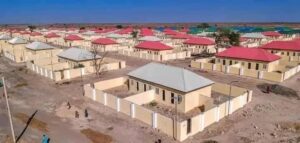NIOB charges govt to provide affordable houses for residents in Lagos
By Owoleye Oluwakayode
Members of the Nigerian Institute of Building (NIOB) Lagos chapter, have implored authorities to double efforts at providing affordable and habitable accommodations for people living in the outskirts.They also called for the enforcement of regulations to engender sanity in the housing sector.
The Lagos chapter Chairman, Mr. Sunday Wusu, who spoke to journalists in Lagos, on its forthcoming builders’ conference and yearly general meeting, decried inaccessibility of the hinterlands within the state, stressing that without accessibility of those areas, overcrowding will persist.
He suggested that locations such as Badagry, Epe and Ikorodu among others, should be made a hub like Ikeja and Victoria Island for residents.
Wusu said, “If government want to increase housing and ensure regulation in the highbrow areas, it needs to ensure that fees for the hinterland are reduced such that people can afford homes.”
Speaking on the choice of the theme, ‘Building Regulations and Sustainable Development Goals (SDGs) in Lagos State: Reinvigorating, processes and optimising results,’ he urged government to support cottage industries with funding at low interest rate to produce basic building materials at affordable price.
“If affordable houses are provided, it mitigates issue of building collapse because developers want to get returns on investment. You cannot achieve that when loans are provided at 24 per cent interest rate even up to 28 per cent,” Wusu said.
On the need for effective building control in Lagos, he said: “Building can’t collapse on paper, that a building has a certificate doesn’t mean that it can’t collapse, but let the processes be in order and cost of getting all these certificates be affordable.”
The Chairman further stressed the need for developers and homeowners to obtain certificate of habitation and fitness for buildings.
The Chairman, local organising committee of the conference, Lucky Isaname, explained that the forum aims to ensure effective implementation of Building Control Regulation and Sustainable Development Goals (SDGs) II, engage stakeholders on the full implementation and enforcement of the regulation.
He added that the gathering would also create a robust awareness among participants on the importance of the regulation and how it can help the state to achieve the SDG, which Nigeria as a nation signed to uphold.
Isaname said, “The forum seeks to dissect the limitations and challenges being faced by the principal stakeholders on the implementation of the regulation and proffer long-term solutions. Analyse the roles of professional bodies in the built-environment in ensuring the implementation of the regulation, emphasise the importance of builders documents by every developer before the commencement of construction works.”
Experts expected to educate the stakeholders at the forum, include the General Manager of (LASBCA), Gbolahan Oki, Commissioner for Physical Planning and Urban Development, Dr. Idris Salako, General Manager, Lagos State Safety Commission, Mr Lanre Mojola, General Manager of the state’s Materials Testing Laboratory, Olufunsho Elulade and the special adviser to Governor Babajide Sanwo-Olu on Housing – Mrs. Toke Benson Awoyinka and others.
On non-compliance to construction regulations, a member of the institute, Mr. Philips Olusesan, pointed out that the Physical Planning Permit Authority (LASPPPA) alongside building control agency are responsible for determining planning of every space in the state.
“If there is any illegal structure ongoing anywhere, we expect that LASPPPA officials would spring into action to stop it but developers are often at advance stages before officials visits such sites. Once a developer doesn’t have a building approval, such a building should be stopped immediately,” he said.
Contributing, Mr. Mubarak Gbajabiamila, said the institute is not satisfied with the way buildings are springing up arbitrarily, irrespective of the growing population, estimated at about 25 million people.




